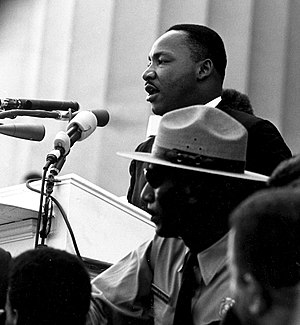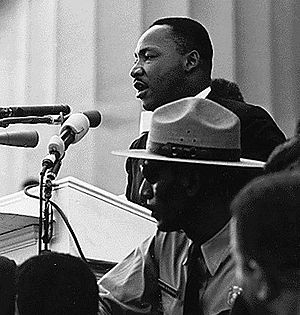On the 49th anniversary of Martin Luther King, Jr.’s “I Have a Dream” speech, it seems fitting to reflect on where we are in fulfilling it.
Back in January, I wrote this for King’s birthday:
It should surprise none of us that a leader villified by the conservative white community as “uppity” would become as innocuous a figure in our time as King has become. Discussions of race relations in the United States seem to require the opening statement: “let’s begin by recognizing how far we’ve come”. We bow before the common wisdom that demands that we celebrate that racism is still practiced, but illegal! That our systems reinforce segregation by income rather than race specifically. That discrimination based on race is passe, unlike sexual orientation, disability, or felony conviction, which is still wildly popular. That King’s daughter would still live in a world in which her worth to the labor market is still 77% of a man’s.
For more, you can find the post here.

The problem with conversations about race in 2012 is that we are living with a dream unfulfilled. King’s Dream is a dramatic incarnation of GOD’s dream–that King spoke of not only an end to segregation, but discrimination and those means by which the powerful demean and steal the power from others. In our day, it is not only race, but economics, ability, sex, gender, sexual orientation, education, experience, geography, and social diversity that allow the powerful to not only keep, but expand power.The very things that prevent a little black girl and a little white girl from playing side by side.
It was 17 years after that moment that “Trickle Down Economics” was unleashed on the world. A theory that argued for redistributing money to the top of the food chain so that the rest could fight over the scraps. The very antipothy of King’s Dream.
And even now, in this election season, we are having the same conversation as one slate of candidates has made the same ethic its primary economic proposition, calling such distribution a benefit to us all, as it is they who are the job creators.
And yet, it is still so clearly about both race and inequality. About a system that maintains inequality. We defend a system of unfairness because we believe it actually is fair. This was Jesus’s very critique of the Pharisees, whose arguments of fairness to the widow whose son has died are condemned by Jesus as wholly unfair.
We foolishly believe that the issue is about internal prejudice, when the graver ill is systemic oppression. Our race legacy is that we have forgotten the very definition of racism. Until we rediscover it, King’s Dream, as GOD’s Dream, will never be a reality.

Leave a Reply